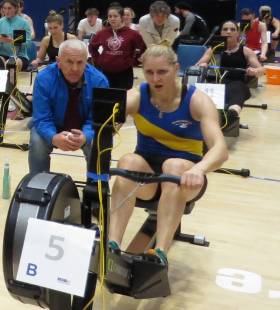Displaying items by tag: Irish Indoor Rowing
McKeown and Puspure Best at Irish Indoor Rowing Championships
#Rowing: Sam McKeown set a new Irish record of five minutes 53 seconds at the Irish Indoor Rowing Championships at the University of Limerick today. The Queen’s University man was the only competitor to breach the six-minute mark.
In the women’s competition, Sanita Puspure ruled. Her time of 6:39.8 was not her best, but she had almost 12 seconds to spare over Aileen Crowley, who was hitting a new personal mark. Emily Hegarty won the women’s under-23 section and Conor Egan the men’s.
Denise Walsh was the best lightweight woman on the day, while Aoife Hegarty the best under-23 lightweight. Aodhan Burns topped the men’s open lightweight ranks, which were very spare, while Jake McCarthy bettered his twin, Fintan, in the men’s under-23 lightweight competition.
The best juniors were Alex Byrne of Shandon and Zoe McCutcheon of Enniskillen.
Irish Indoor Rowing Championships, University of Limerick, Saturday (Selected Results)
Men
Open: S McKeown 5:53.0. Under-23: C Egan 6:08.1. Jun 18: A Byrne 6:15.0. Jun 16: A Sheehan 6:47.3.
Lightweight Open: A Burns 6:29.9. Lightweight Under-23: J McCarthy 6:22.2.
Women
Open: S Puspure 6:39.8. Under-23: E Hegarty 6:56.7. Jun 18: Z McCutcheon 7:19.7. Jun 16: M Curry 7:21.0
Lightweight Open: D Walsh 7:13.4. Lightweight Under-23: A Casey 7:18.1.
Stars to Shine at Indoor Rowing Championships
#Rowing: The entry for the Irish Indoor Rowing Championships on Saturday (January 21st) at the University of Limerick is over 200 up on last year, a new record for the event. There are 1202 entrants from 115 clubs, 63 of them Rowing Ireland clubs. There are over 40 entrants from overseas, with 39 from the United Kingdom. Races will run every five to 10 minutes and there are 1663 race slots in total. The event is compulsory for high performance rowers and Ireland Olympians Paul and Gary O’Donovan, Claire Lambe and Sanita Puspure are entered. There is no charge for spectators.































































